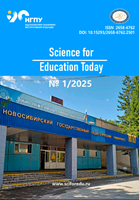Формирование межкультурной компетентности обучающихся в высшей технической школе: оценка содержания и эффективности
Formation of students’ cross-cultural competencies in a technical university: Assessment of content and effectiveness
Author(s): Lamara L. Mekhrishvili, Anzhelika A. NovikovaSubject(s): Higher Education , Sociology of Culture, Sociology of Education
Published by: Новосибирский государственный педагогический университет
Keywords: Cross-cultural competence; Technical higher educational institutions; Soft skills; Interactive educational technologies;
Summary/Abstract: Introduction. The article presents an overview of pedagogical, linguistic and psychologicalsocial studies addressing cross-cultural competence as a multidimensional construct and considers the problems of developing students’ cross-cultural competencies in a modern technical higher educational institution with the main focus on developing popular soft skills. The aim of the research is to identify the components of the cross-cultural competence as a construct and evaluate the level of their formation in technical university students, as well as to propose effective mechanisms for their development. Materials and Methods. The research methods used include the analysis of scholarly literature on the issue under study, generalization and comparative analysis, methods of mathematical statistics, empirical methods (questionnaires and scale techniques). Results. Based on theoretical analysis and empirical research, the specific components of ‘crosscultural competence’ have been determined, including linguo-cultural, sociocultural and personalitycentered aspects. The empirical research indicated that students in Russian technical higher educational institutions demonstrate a moderate level of cross-cultural competence, while foreign students show ‘above average’ and ‘high’ levels. The authors note that in the framework of analyzing modern competency education models, a high correlation between soft skills and cross-cultural competency components has been identified. Conclusions. The study concludes that the demand for cross-cultural interaction in the scientific, cultural, social and personal spheres determines the significance of linguacultural, sociocultural, and personality-centered components within the cross-cultural competence. Despite the inclusion of crosscultural competence in the universal competencies index of the Federal State Educational Standard and the Law “On Education”, in the educational space of technical higher educational institutions, effective mechanisms for its formation have not been developed sufficiently, since the overwhelming majority of respondents - students demonstrate an “average level” of cross-cultural competence components. The study revealed a close relationship between the level of soft skills and the cross-cultural competence components and proposed effective teaching technologies for their development.
Journal: Science for Education Today
- Issue Year: 15/2025
- Issue No: 1
- Page Range: 201-220
- Page Count: 20
- Language: Russian

